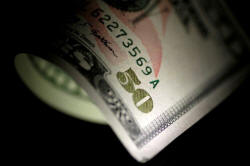Crown stands out in quiet market after Sweden calls end
to QE
 Send a link to a friend
Send a link to a friend
 [December 20, 2017]
By Tommy Wilkes [December 20, 2017]
By Tommy Wilkes
LONDON (Reuters) - Sweden's crown rose half
a percent on Wednesday after the country's central bank called an end to
its quantitative easing scheme, as higher-profile currencies saw little
activity in generally thin pre-holiday trade.
The crown initially jumped almost one percent against the euro before
giving up some of those gains.
Holding interest rates unchanged, the Riksbank said it would end new net
bond purchases though coupons and maturing bonds would be reinvested,
signalling a temporary expansion of its balance sheet.
"Most of the gains were retraced because the Riksbank gave quite a
dovish tone," said Thu Lan Nguyen, an FX strategist at Commerzbank.
But she and other analysts said that, after disappointing previous
predictions that it would end quantitative easing, the central bank's
announcement was a boost for the crown overall.

"It made the first step towards exiting its monetary expansionary
policy. It also said it expects the crown to appreciate against the euro
which is positive for the currency," Nguyen said.
The central bank in neighbouring Norway last week surprised markets by
signalling interest rate rises sooner than expected.
The crown was up 0.59 percent at 9.8945 per euro, having earlier risen
to 9.8595, its strongest since Dec. 12. <EURSEK=D3>
The Riksbank has been reluctant to tighten policy despite inflation
being above or close to its 2 percent target for most of the year and a
strongly-performing economy, putting it out of step with other central
banks, many of which have turned more hawkish.
[to top of second column] |

A U.S. Dollar note is
seen in this June 22, 2017 illustration photo. REUTERS/Thomas
White/Illustration/File Photo

The crown has lost nearly 7 percent of its value against the euro over
the last three months
BOJ TAPER NEXT?
The euro held on to small gains with analysts saying that expectations
of the Trump administration's landmark U.S. tax overhaul were largely
priced in to the dollar.
Year-end portfolio moves and a rise in German bond yields also helped
keep the euro broadly unchanged at 1.184 against the greenback <EUR=>.
The euro was up 0.3 percent against the Japanese yen at 133.99.
The dollar stood at 113.18 yen <JPY=>, up 0.8 percent on the day, having
pulled away from Friday's low of 112.035, with last week's high of
113.75 seen as its next target.
Gains in the dollar were limited as many market players looked to
Thursday's outcome of the Bank of Japan's two-day policy meeting for
clues to whether it will join the U.S. Federal Reserve and European
central banks in winding back stimulus.
A speech by BOJ Governor Haruhiko Kuroda in November sparked speculation
of a stimulus taper when he mentioned the concept of a 'reversal rate' -
a level at which low interest rates start to have more harmful
side-effects than benefits.
(Reporting by Tommy Wilkes; Additional reporting by Hideyuki Sano in
TOKYO and Masayuki Kitano in SINGAPORE; editing by John Stonestreet)
[© 2017 Thomson Reuters. All rights
reserved.] Copyright 2017 Reuters. All rights reserved. This material may not be published,
broadcast, rewritten or redistributed.
 |